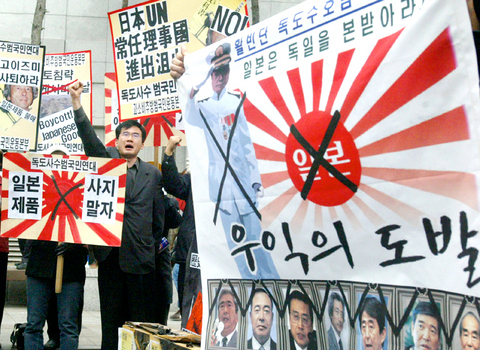A dispute over school textbooks escalated yesterday as Tokyo accused Beijing of whipping up anti-Japanese sentiment and the South Korean government summoned the Japanese ambassador over the issue.
Japan's decision on Tuesday to approve a textbook which both China and South Korea say glosses over Japanese wartime atrocities has opened old wounds.
The Japanese ambassador to Seoul was summoned yesterday to receive South Korea's protest over the textbook, one day after the ambassador in Beijing was called in to hear a similar protest from the Chinese government.

PHOTO: AFP
Koreshige Anami, Japan's envoy to Beijing, responded to the protest with robust criticism of the Chinese government.
"Anami expressed concern about recent anti-Japanese demonstrations in various cities in China," an embassy spokesman said. "He asked the Chinese authorities to take necessary measures to protect Japanese people and companies' activities in China.
"He observed that patriotic education in China may have caused some anti-Japanese feelings among young Chinese people. Anami asked the Chinese government to pay full attention to this aspect," the spokesman said.
China's state-controlled media reacted furiously, accusing Japan of not being able to face up to its past.
"One thing is for sure, and that is a country's prestige is not built on subterfuge, but its acknowledgment of the past," the China Daily said in an editorial, which called the textbook a "political provocation."
"Without a consensus on the history issue and other disputes, the Asian peoples cannot place their trust in Japan's desire to play a bigger role in world affairs," it said.
Local academics warned that the Sino-Japanese row may spill over into trade.
Some Chinese shops have stopped selling selected Japanese goods in protest, an industry official confirmed yesterday. It was not clear how many stores had stopped selling Japanese products, but one association official said the boycott campaign had begun in Shanghai and the northeastern city of Shenyang.
In recent days, crowds opposed to Japan's bid for a permanent seat on the UN Security Council have gathered outside Japanese-owned department stores and supermarkets in several Chinese cities.
In some instances, they have smashed windows or tried to hoist the Chinese flag.
Anami defended Japan's decision to approve the textbook, one of eight that can be used to instruct students aged 13 to 15 from April next year, saying it was a question of freedom of expression.
"Textbooks for Japanese schools are not made by the government or government organizations, but by private companies," the spokesman said, citing Anami. "In Japan we ensure freedom of speech and publication. So if draft textbooks submitted by publishing companies to the ministry of education fulfill certain criteria, they are allowed to be published."
The book avoids the word "invasion" when it refers to Japan's military occupation of other Asian countries in the first half of the 20th century.
It also refers to the 1937 Nanjing Massacre -- in which some historians say at least 300,000 Chinese civilians were slaughtered by Japanese troops -- as an "incident" in which "many" Chinese were killed.

Four people jailed in the landmark Hong Kong national security trial of "47 democrats" accused of conspiracy to commit subversion were freed today after more than four years behind bars, the second group to be released in a month. Among those freed was long-time political and LGBTQ activist Jimmy Sham (岑子杰), who also led one of Hong Kong’s largest pro-democracy groups, the Civil Human Rights Front, which disbanded in 2021. "Let me spend some time with my family," Sham said after arriving at his home in the Kowloon district of Jordan. "I don’t know how to plan ahead because, to me, it feels

Poland is set to hold a presidential runoff election today between two candidates offering starkly different visions for the country’s future. The winner would succeed Polish President Andrzej Duda, a conservative who is finishing his second and final term. The outcome would determine whether Poland embraces a nationalist populist trajectory or pivots more fully toward liberal, pro-European policies. An exit poll by Ipsos would be released when polls close today at 9pm local time, with a margin of error of plus or minus 2 percentage points. Final results are expected tomorrow. Whoever wins can be expected to either help or hinder the

North Korea has detained another official over last week’s failed launch of a warship, which damaged the naval destroyer, state media reported yesterday. Pyongyang announced “a serious accident” at Wednesday last week’s launch ceremony, which crushed sections of the bottom of the new destroyer. North Korean leader Kim Jong-un called the mishap a “criminal act caused by absolute carelessness.” Ri Hyong-son, vice department director of the Munitions Industry Department of the Party Central Committee, was summoned and detained on Sunday, the Korean Central News Agency (KCNA) reported. He was “greatly responsible for the occurrence of the serious accident,” it said. Ri is the fourth person

The collapse of the Swiss Birch glacier serves as a chilling warning of the escalating dangers faced by communities worldwide living under the shadow of fragile ice, particularly in Asia, experts said. Footage of the collapse on Wednesday showed a huge cloud of ice and rubble hurtling down the mountainside into the hamlet of Blatten. Swiss Development Cooperation disaster risk reduction adviser Ali Neumann said that while the role of climate change in the case of Blatten “still needs to be investigated,” the wider impacts were clear on the cryosphere — the part of the world covered by frozen water. “Climate change and